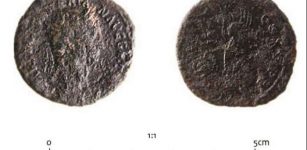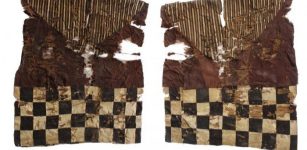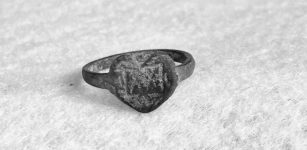Why Is Africa Called Africa?
Conny Waters - AncientPages.com - We read about historical places and events without thinking about what’s behind a name. For example, we can ask - Why is Africa called Africa? How did the African continent get its name?
After Asia, Africa is the world’s second-largest continent. There are 54 countries and territories in Africa, and 11 billion people inhabit them. It’s a beautiful but poor continent that is often forgotten by the western world.
According to historians, there could be several plausible explanations as to why Africa is called Africa.
1644: Willem Janszoon Blaeu. "One of the most decorative and popular of all early maps of Africa, from the 'golden age' of Dutch mapmaking. First issued in 1630, the map was reprinted many times between 1631 and 1667, appearing in Latin, French, German, Dutch, and Spanish editions of Blaeu’s atlases." Credit: Public Domain
The most accepted and widespread theory states that the ancient Romans gave the continent its name after the North African Berber tribe Afri. The Afri lived in caves near the city of Carthage (also called Karthago), corresponding to modern-day Tunisia. During this period, Carthage was inhabited by people who were at war with the ancient Romans. About 146 B.C. Carthage and surrounding areas were destroyed by the Roman Empire and declared a Roman province.
See also: More Ancient History Facts
The Latin word "ca" means "land". Instead of naming the new province Carthage, it was given the name Africa because the Afri tribe was loyal to the leadership in Rome. Therefore, Africa means "the Land of the Afri".
According to another theory, Africa has its origin in the Latin word "aprica", which means "sunny" or the ancient Greek term "aphrike", which stands for "without cold".
Some historians have also suggested a connection between the African continent and the Egyptian word "af-rui-ka", which means "to turn toward the opening of Ka". In Egyptian mythology Ka was the power of the soul, an energetic double of every person. This means "af-rui-ka" can be translated as "the place of birth".
A different theory emerged in the early sixteenth century when famous explorer Leo Africanus who documented everything he saw while visiting many places in North Africa came suggested that the name ‘Africa’ was derived from the Greek word ‘a-phrike’, meaning ‘without cold,’ or ‘without horror’. This is rather logical in fact because “other historians have suggested that the Romans may have derived the name from the Latin word for sunny or hot, namely ‘aprica’. Where exactly the Romans got the name ‘Africa’ from is, however, still in dispute.” 1
Many scientists have suggested that Africa is home to the first humans. If this is true, then the phrase "place of birth" should be considered more seriously, as Africa could be the birthplace of humankind.
Talking about names, do you know why Europe is called Europe?
Written by Conny Waters – AncientPages.com Staff Writer
Updated on July 4, 2021
Copyright © AncientPages.com All rights reserved. This material may not be published, broadcast, rewritten or redistributed in whole or part without the express written permission of AncientPages.com
Expand for references- South African History – Africa _ What’s In A Name?
- Lewis, Martin and Karen E. Wigen - ‘The Architecture of Continents: The Development of the Continental Scheme’, in The Myth of Continents: A Critique of Metageography
More From Ancient Pages
-
 Jason And The Argonauts – Hate, Sorcery, Love And Jealousy Reign In This Famous Greek Story
Featured Stories | Jan 6, 2022
Jason And The Argonauts – Hate, Sorcery, Love And Jealousy Reign In This Famous Greek Story
Featured Stories | Jan 6, 2022 -
 Legendary Bladud: The Flying King And Historical Founder Of Bath, England
Featured Stories | Mar 8, 2016
Legendary Bladud: The Flying King And Historical Founder Of Bath, England
Featured Stories | Mar 8, 2016 -
 Artifacts Discovered At Yirra Confirm Aboriginal People Lived In Pilbara During The Last Ice Age
Archaeology | Apr 12, 2022
Artifacts Discovered At Yirra Confirm Aboriginal People Lived In Pilbara During The Last Ice Age
Archaeology | Apr 12, 2022 -
 Intriguing El Tajin – Pre-Hispanic Ceremonial Site Dedicated To Totonac Rain God
Featured Stories | Jul 17, 2016
Intriguing El Tajin – Pre-Hispanic Ceremonial Site Dedicated To Totonac Rain God
Featured Stories | Jul 17, 2016 -
 Mystery Of King Solomon’s Mines: An Unsolved Ancient Enigma
Featured Stories | Aug 9, 2018
Mystery Of King Solomon’s Mines: An Unsolved Ancient Enigma
Featured Stories | Aug 9, 2018 -
 Vercingetorix: Greatest Of All Gallic Leaders And Hero Of The French People
Featured Stories | Jun 24, 2020
Vercingetorix: Greatest Of All Gallic Leaders And Hero Of The French People
Featured Stories | Jun 24, 2020 -
 Hoard Of Roman Bronze Coins Turns Out To Be Offering For Safe Crossing
Archaeology | Jul 2, 2021
Hoard Of Roman Bronze Coins Turns Out To Be Offering For Safe Crossing
Archaeology | Jul 2, 2021 -
 Medieval Celtic Mystery Written In Konungs Skuggsja – The King’s Mirror
Featured Stories | Sep 13, 2018
Medieval Celtic Mystery Written In Konungs Skuggsja – The King’s Mirror
Featured Stories | Sep 13, 2018 -
 Mysterious Jomsvikings: Fearless Scandinavian Warrior-Brotherhood
Featured Stories | Apr 26, 2016
Mysterious Jomsvikings: Fearless Scandinavian Warrior-Brotherhood
Featured Stories | Apr 26, 2016 -
 Rare And Well-Preserved Inka Tunic Discovered In Chile
Archaeology | Feb 14, 2023
Rare And Well-Preserved Inka Tunic Discovered In Chile
Archaeology | Feb 14, 2023 -
 Unique Heart-Shaped Jesuit Ring At Fort St. Joseph In Michigan
Archaeology | Sep 17, 2022
Unique Heart-Shaped Jesuit Ring At Fort St. Joseph In Michigan
Archaeology | Sep 17, 2022 -
 Fragarach: Supernatural Sword That Controlled Winds, Cut Through Wood, Metal And Bricks In Irish Myths And Legends
Featured Stories | Apr 30, 2025
Fragarach: Supernatural Sword That Controlled Winds, Cut Through Wood, Metal And Bricks In Irish Myths And Legends
Featured Stories | Apr 30, 2025 -
 Khara-Khoto ‘Black City’ – Besieged By Genghis Khan But Flourished Under Mongol Rule
Featured Stories | May 13, 2021
Khara-Khoto ‘Black City’ – Besieged By Genghis Khan But Flourished Under Mongol Rule
Featured Stories | May 13, 2021 -
 Controversial 5,500-Year-Old Sumerian Star Map Of Ancient Nineveh Reveals Observation Of Köfels’ Impact Event
Artifacts | Dec 28, 2018
Controversial 5,500-Year-Old Sumerian Star Map Of Ancient Nineveh Reveals Observation Of Köfels’ Impact Event
Artifacts | Dec 28, 2018 -
 On This Day In History: Berlin Victory Parade Took Place – On September 7, 1945
News | Sep 7, 2016
On This Day In History: Berlin Victory Parade Took Place – On September 7, 1945
News | Sep 7, 2016 -
 Diver Says He Found Mysterious Underwater Ancient Tomb, Ruins And Artifacts Of An Unknown Advanced Civilization
Featured Stories | Oct 10, 2023
Diver Says He Found Mysterious Underwater Ancient Tomb, Ruins And Artifacts Of An Unknown Advanced Civilization
Featured Stories | Oct 10, 2023 -
 Rare Ancient Clothes And Shoes Found Under The Ice At The Lost Lendbreen Mountain Pass
Featured Stories | Feb 9, 2023
Rare Ancient Clothes And Shoes Found Under The Ice At The Lost Lendbreen Mountain Pass
Featured Stories | Feb 9, 2023 -
 Rare Collection Of Roman Coins Unearthed In Ancient City Of Aizanoi, Turkey
News | Feb 4, 2021
Rare Collection Of Roman Coins Unearthed In Ancient City Of Aizanoi, Turkey
News | Feb 4, 2021 -
 Who Made The Intriguing Wawa Runestone Found In Ontario, Canada?
Archaeology | Jun 25, 2025
Who Made The Intriguing Wawa Runestone Found In Ontario, Canada?
Archaeology | Jun 25, 2025 -
 Secret Encounter With A Mysterious ‘Out-Of-Place’ Lost Tribe In The Amazon Jungle – Did They Possess Strange Mental Powers?
Featured Stories | Jan 16, 2025
Secret Encounter With A Mysterious ‘Out-Of-Place’ Lost Tribe In The Amazon Jungle – Did They Possess Strange Mental Powers?
Featured Stories | Jan 16, 2025

